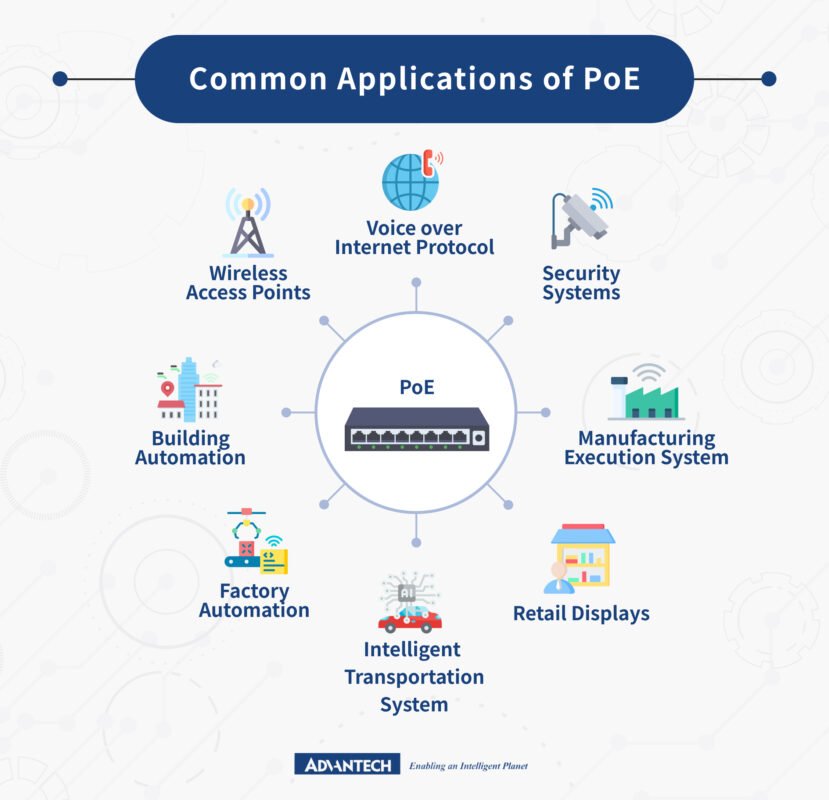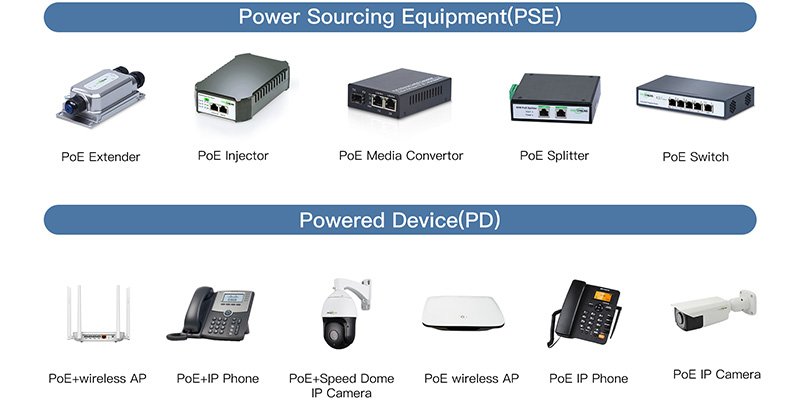Power over Ethernet (PoE) LAN Networking
What Is PoE in Networking? The Cost-Saving Solution for Kenyan Businesses
Power over Ethernet (PoE) is a revolutionary technology that allows standard network cables to deliver both electrical power and data connectivity to PoE-enabled devices.
Power over Ethernet -enabled devices cover a broad range of network and smart devices designed to receive power and data over a single Ethernet cable. Common PoE devices include:
-
Network Switches with PoE ports (e.g., Cisco Catalyst series, Ubiquiti Edge Switch, MikroTik CRS series)
-
Wireless Access Points (e.g., TP-Link EAP320, EAP330, Ubiquiti UniFi Access Points)
-
IP Security Cameras
-
VoIP Phones
-
Network Video Recorders (NVRs)
-
Smart Doorbells
-
Thin clients and mini-PCs designed for PoE

For businesses and organizations in Nairobi, Mombasa, and across Kenya, PoE offers immense value:
- Cost Efficiency: You eliminate the need to run separate, costly electrical wiring alongside your data cabling. This saves significantly on material and installation time, a key factor in managing project budgets across East Africa.
- Flexibility and Speed: PoE allows you to place devices like IP security cameras, Wi-Fi access points, and VoIP phones exactly where they are most effective, regardless of a nearby electrical outlet. This simplifies deployment, especially for remote or high-ceiling installations common in commercial buildings and warehouses in the region.
- Power Redundancy: When your network is protected by a UPS system (which TDK Solutions also provides), your PoE-powered devices (PDs) remain operational during the common power fluctuations and outages experienced in the Kenyan grid.
These benefits have driven a sharp increase in PoE adoption, particularly in the rapidly expanding security and smart building sectors in Kenya.
How Does PoE Work? Understanding the Mechanism
The core of PoE is simple: it utilizes the four twisted pairs within a standard Cat5e, Cat6, or Cat6A Ethernet cable (which are the backbone of most TDK Solutions structured cabling installations).
In the earliest PoE standards, power was sent over two spare twisted pairs, while the other two pairs handled data (referred to as 2-pair PoE).
With modern and high-power PoE standards, both power and data are simultaneously sent over all four twisted pairs. This does not cause interference because the data is transmitted at a very high frequency (up to 100 million Hz for Gigabit Ethernet), while the electrical power operates at a very low frequency (60 Hz or less). They effectively travel on opposite ends of the frequency spectrum without conflict.
Evolution of PoE Standards: Powering Kenya’s Digital Leap
The major limiting factor for PoE has always been the maximum power it can deliver. As Nairobi’s corporate offices and data centers adopt high-demand devices, the power requirements have skyrocketed. The IEEE standards have evolved to meet this demand:
The Legacy Standards (2-Pair PoE)
| Standard Name | IEEE Standard | Max. Power per Port | Power to Device (PD) | Common Kenyan Use Cases |
| PoE (Type 1) | IEEE 802.3af | 15.4 W | 12.95 W | Static surveillance cameras, standard VoIP phones, low-power access points. |
| PoE+ (Type 2) | IEEE 802.3at | 30 W | 25.5 W | PTZ (Pan-Tilt-Zoom) cameras, Video IP phones, modern alarm/access control systems. |
PoE+ (802.3at) is the most common standard for new security and Wi-Fi installations in Kenya, offering sufficient power for most single-radio wireless access points and advanced security cameras that need to run heaters or motors.
Introducing PoE++ (Type 3 & 4) for Smart Buildings (4-Pair PoE)
To meet the power demands of true smart buildings and IoT deployment in Kenya, the latest standard uses all four twisted pairs to deliver significantly more power:
| Type Name | IEEE Standard | Max. Power per Port | Power to Device (PD) | TDK Solutions Application Focus |
| PoE++ (Type 3) | IEEE 802.3bt | 60 W | 51 W | Video conferencing equipment, Multi-radio Wi-Fi 6/7 access points, building management systems. |
| High-Power PoE (Type 4) | IEEE 802.3bt | 100 W | 71.3 W | PoE-powered LED lighting systems, Flat-screen displays, retail POS terminals, thin clients. |
The move to 802.3bt is crucial for networking needs looking to future-proof their network, especially as it supports higher data speeds like 2.5GBASE-T, 5GBASE-T, and 10GBASE-T, far exceeding the 1-Gbps limit of older standards. Furthermore, the new standard significantly boosts energy efficiency by minimizing power loss in the cable, which is an important operational cost consideration for any business in Kenya.
Essential PoE Products:
As a leading provider of networking equipment in Nairobi and East Africa, TDK Solutions Ltd stocks a comprehensive range of PoE products compatible with all IEEE standards (802.3af/at/bt).
PoE Ethernet Switches (Power Source Equipment – PSE)
PoE Switches are the most common and efficient way to deploy PoE. They inject power directly into the Ethernet cable from the central network rack.
We supply switches from top brands like Ubiquiti (UniFi), Cisco, D-Link, and Huawei. Our switches support PoE, PoE+, and high-budget PoE++ to handle high-density CCTV and Ubiquiti Access Point deployments simultaneously.
PoE Injectors & Adapters (Midspans)
A PoE Injector adds PoE capability to a non-PoE network switch. This is ideal for quickly powering a single IP camera or Access Point without replacing an entire switch.
We stock a wide range of single-port injectors, including Ubiquiti U-POE-AT and TP-Link models, allowing businesses to cost-effectively upgrade specific device locations without full infrastructure overhaul.
PoE Splitters
PoE Splitters receive the combined PoE signal and separate the data and power back onto two different lines. This allows you to power a legacy or non-PoE device (like a basic router or non-PoE-enabled desktop) using the PoE infrastructure.
PoE Extenders / Repeaters
Standard Ethernet/PoE has a distance limit of 100 meters. PoE Extenders are vital for long-distance deployments, such as large parking lots, remote gates, or expansive facility surveillance, allowing you to reach far-away devices without sacrificing speed or power.
PoE Media Converters
These devices are essential for hybrid networks. A PoE Media Converter acts as a copper-to-fiber converter while simultaneously injecting power for a remote PoE device, ideal for extending your network backbone over long-distance fiber links and providing power at the remote end.
PoE Applications & Benefits: Local Relevance in Kenya
PoE is instrumental in facilitating the modernization of Nairobi’s commercial, residential, and industrial sectors.
| Application Area | Relevance in Kenya | Key Benefit |
| IP Surveillance & Security | PoE powers high-resolution PTZ cameras and NVRs. Crucial for simplified, centralized deployment of reliable security systems, which are a major priority for businesses and homes in Kenya. | Uninterrupted Security via UPS-backed power. |
| VoIP Telephony & Call Centers | PoE provides constant power to Cisco and Yealink IP phones. Critical for maintaining essential voice communication during power outages. | Business Continuity during power dips. |
| Wireless Connectivity | PoE powers all modern Wi-Fi 6/7 Access Points. Ensures optimal placement of APs (often high on walls/ceilings) for seamless coverage in large office spaces. | Optimal Wi-Fi Coverage without power limitations. |
| Smart Buildings & IoT | High-Power PoE++ supports smart LED lighting systems, retail video kiosks, and access control systems, allowing full integration onto a single IP network. | Simplified Management and Energy Savings. |
Your PoE networking needs in Nairobi, Kenya, you benefit from:
- Authenticity Guarantee: We guarantee 100% authentic, new-in-box products from verified distributors. Avoid the risk of counterfeit networking equipment prevalent in the market.
- Expert Consultation: Our technical team provides expert advice to ensure you select the correct PoE standard (af, at, or bt) and the appropriate power budget for your current and future network needs.
- Local Support: Convenient pick-up and same-day delivery options available in Nairobi, CBD, and reliable shipping across Kenya and East Africa.


